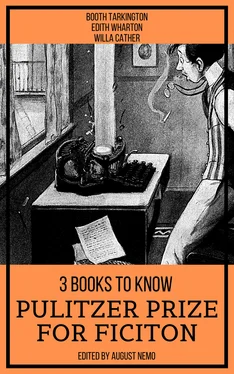“I didn't mean that,” Fanny explained. “I meant from the station. Did you drive out to their house with her before you came here?”
“No. She drove home with her father, of course.”
“Oh, I see. So Eugene came to the station to meet you.”
“To meet us?” George echoed, renewing his attack upon the salmon salad. “How could he?”
“I don't know what you mean,” Fanny said drearily, in the desolate voice that had become her habit. “I haven't seen him while your mother's been away.”
“Naturally,” said George. “He's been East himself.”
At this Fanny's drooping eyelids opened wide.
“Did you see him?”
“Well, naturally, since he made the trip home with us!”
“He did?” she said sharply. “He's been with you all the time?”
“No; only on the train and the last three days before we left. Uncle George got him to come.”
Fanny's eyelids drooped again, and she sat silent until George pushed back his chair and lit a cigarette, declaring his satisfaction with what she had provided. “You're a fine housekeeper,” he said benevolently. “You know how to make things look dainty as well as taste the right way. I don't believe you'd stay single very long if some of the bachelors and widowers around town could just once see—”
She did not hear him. “It's a little odd,” she said.
“What's odd?”
“Your mother's not mentioning that Mr. Morgan had been with you.”
“Didn't think of it, I suppose,” said George carelessly; and, his benevolent mood increasing, he conceived the idea that a little harmless rallying might serve to elevate his aunt's drooping spirits. “I'll tell you something, in confidence,” he said solemnly.
She looked up, startled. “What?”
“Well, it struck me that Mr. Morgan was looking pretty absent-minded, most of the time; and he certainly is dressing better than he used to. Uncle George told me he heard that the automobile factory had been doing quite well—won a race, too! I shouldn't be a bit surprised if all the young fellow had been waiting for was to know he had an assured income before he proposed.”
“What 'young fellow'?”
“This young fellow Morgan,” laughed George; “Honestly, Aunt Fanny, I shouldn't be a bit surprised to have him request an interview with me any day, and declare that his intentions are honourable, and ask my permission to pay his addresses to you. What had I better tell him?”
Fanny burst into tears.
“Good heavens!” George cried. “I was only teasing. I didn't mean—”
“Let me alone,” she said lifelessly; and, continuing to weep, rose and began to clear away the dishes.
“Please, Aunt Fanny—”
“Just let me alone.”
George was distressed. “I didn't mean anything, Aunt Fanny! I didn't know you'd got so sensitive as all that.”
“You'd better go up to bed,” she said desolately, going on with her work and her weeping.
“Anyhow,” he insisted, “do let these things wait. Let the servants 'tend to the table in the morning.”
“No.”
“But, why not?”
“Just let me alone.”
“Oh, Lord!” George groaned, going to the door. There he turned. “See here, Aunt Fanny, there's not a bit of use your bothering about those dishes tonight. What's the use of a butler and three maids if—”
“Just let me alone.”
He obeyed, and could still hear a pathetic sniffing from the dining room as he went up the stairs.
“By George!” he grunted, as he reached his own room; and his thought was that living with a person so sensitive to kindly raillery might prove lugubrious. He whistled, long and low, then went to the window and looked through the darkness to the great silhouette of his grandfather's house. Lights were burning over there, upstairs; probably his newly arrived uncle was engaged in talk with the Major.
George's glance lowered, resting casually upon the indistinct ground, and he beheld some vague shapes, unfamiliar to him. Formless heaps, they seemed; but, without much curiosity, he supposed that sewer connections or water pipes might be out of order, making necessary some excavations. He hoped the work would not take long; he hated to see that sweep of lawn made unsightly by trenches and lines of dirt, even temporarily. Not greatly disturbed, however, he pulled down the shade, yawned, and began to undress, leaving further investigation for the morning.
But in the morning he had forgotten all about it, and raised his shade, to let in the light, without even glancing toward the ground. Not until he had finished dressing did he look forth from his window, and then his glance was casual. The next instant his attitude became electric, and he gave utterance to a bellow of dismay. He ran from his room, plunged down the stairs, out of the front door, and, upon a nearer view of the destroyed lawn, began to release profanity upon the breezeless summer air, which remained unaffected. Between his mother's house and his grandfather's, excavations for the cellars of five new houses were in process, each within a few feet of its neighbour. Foundations of brick were being laid; everywhere were piles of brick and stacked lumber, and sand heaps and mortar beds.
It was Sunday, and so the workmen implicated in these defacings were denied what unquestionably they would have considered a treat; but as the fanatic orator continued the monologue, a gentleman in flannels emerged upward from one of the excavations, and regarded him contemplatively.
“Obtaining any relief, nephew?” he inquired with some interest. “You must have learned quite a number of those expressions in childhood—it's so long since I'd heard them I fancied they were obsolete.”
“Who wouldn't swear?” George demanded hotly. “In the name of God, what does grandfather mean, doing such things?”
“My private opinion is,” said Amberson gravely, “he desires to increase his income by building these houses to rent.”
“Well, in the name of God, can't he increase his income any other way but this?”
“In the name of God, it would appear he couldn't.”
“It's beastly! It's a damn degradation! It's a crime!”
“I don't know about its being a crime,” said his uncle, stepping over some planks to join him. “It might be a mistake, though. Your mother said not to tell you until we got home, so as not to spoil commencement for you. She rather feared you'd be upset.”
“Upset! Oh, my Lord, I should think I would be upset! He's in his second childhood. What did you let him do it for, in the name of—”
“Make it in the name of heaven this time, George; it's Sunday. Well, I thought, myself, it was a mistake.”
“I should say so!”
“Yes,” said Amberson. “I wanted him to put up an apartment building instead of these houses.”
“An apartment building! Here?”
“Yes; that was my idea.”
George struck his hands together despairingly. “An apartment house! Oh, my Lord!”
“Don't worry! Your grandfather wouldn't listen to me, but he'll wish he had, some day. He says that people aren't going to live in miserable little flats when they can get a whole house with some grass in front and plenty of backyard behind. He sticks it out that apartment houses will never do in a town of this type, and when I pointed out to him that a dozen or so of 'em already are doing, he claimed it was just the novelty, and that they'd all be empty as soon as people got used to 'em. So he's putting up these houses.”
“Is he getting miserly in his old age?”
“Hardly! Look what he gave Sydney and Amelia!”
“I don't mean he's a miser, of course,” said George. “Heaven knows he's liberal enough with mother and me; but why on earth didn't he sell something or other rather than do a thing like this?”
Читать дальше












